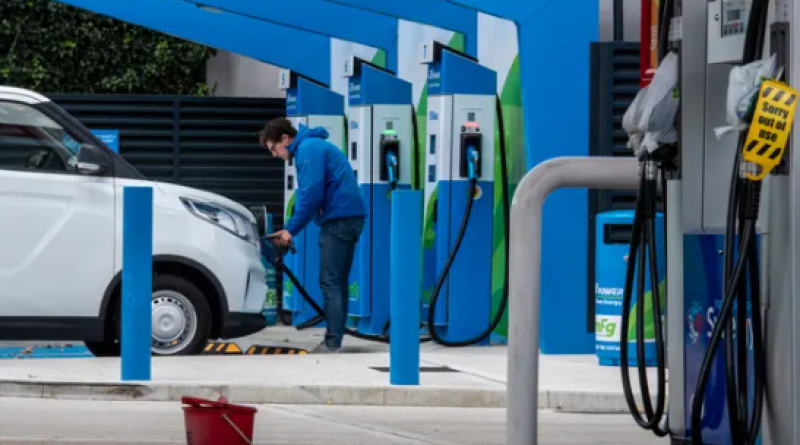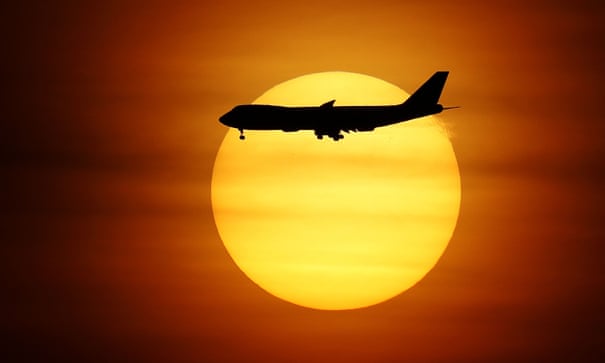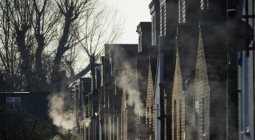Tax flights and ditch gas boilers: ‘blue wall’ voters back green policy

A majority of voters in the Conservative party’s key 41 constituencies believe the UK should be a world leader on climate
Voters in Tory heartlands want the government to do more to tackle the climate crisis, and support measures that many backbench Conservative MPs have balked at, from ditching gas boilers to taxing flights, new polling shows.
The government has delayed or dialled back key measures in recent weeks. There is no sign of the long-awaited heat and building strategy,the net zero strategy has been postponed to later this month, while the environment bill is stuck in parliament as ministers rejected strengthening amendments from the Lords.
Several backbench Tory MPs who have grumbled about the government’s green measures, such as replacing gas boilers with heat pumps, or blamed rising energy prices on the push for renewable power, are expected to air their grievances at the party conference.
But a poll of 41 constituencies in the “blue wall” – long-term Tory-held seats, tilted towards the south but with some in the north of England – has found that a majority of voters there believe the UK should be a world leader on climate, and that the costs of inaction outweigh the costs of action. Six in 10 support the phasing out of gas boilers, while more than half (54%) want a tax on frequent flyers and a similar number (54%) support the phasing out of petrol and diesel vehicles.
Rebecca Newsom, head of politics at Greenpeace UK, which commissioned the poll, said: “This polling shows that there is an electoral risk here for the government, in not following through on their promises on climate change. It is a clear mandate from voters in some of the most important Conservative constituencies for the government to go full throttle on climate action.”
Two thirds want to see more investment in electric vehicles, though replacing fuel duty with road pricing has less support, at about 45% of those polled. Six in 10 also want to see climate aid to poor countries, despite the government’s cuts to overseas aid.

Only 9% of the 1,000 voters surveyed said the government was doing too much on climate, while a quarter said the government was doing enough, and more than half wanted ministers to do more. More than seven in 10 would support new ambitious commitments on climate at the Cop26 summit in Glasgow this November, and a green new deal to invest in jobs.
Newsom said: “There is overwhelming support for all of the so-called ‘controversial’ policies that a vocal minority of those in the party seem intent on trying to delay. The prime minister and chancellor now have no excuse not to ramp up ambitious climate action that voters want to see. If they don’t, it’ll be a disaster for the UK and planet as a whole, but it could very well spell disaster for the Conservatives at the polling station too.”
The Liberal Democrats have made clear they will target “blue wall” voters after their surprise win in the Chesham and Amersham byelection, in which issues such as planning regulations played a major role. Sarah Green, the Lib Dem who overturned the Tory majority of 16,000 to win with an 8,000 majority, said: “This government has over-promised and under-delivered for our environment and voters are fed up of their empty promises. Their recent losses across the blue wall show they can no longer ignore people’s concerns.”
The government has been ramping up its green rhetoric in the run-up to Cop26, with Boris Johnson telling the UN general assembly: “Our grandchildren will know that we are the culprits and that we were warned, and they will know that it was this generation that came centre stage to speak and act on behalf of posterity, and that we missed our cue, and they will ask what kind of people we were to be so selfish and so shortsighted.”
But ministers have also taken a string of decisions that have run counter to the government’s emissions-cutting plans, including new oilfields in the North Sea, a mooted new coal mine, reduced incentives for electric vehicles and scrapping the green homes grant insulation programme.
A Labour spokesperson said: “The Conservatives are climate delayers, who say they want to tackle the climate crisis but refuse to act at the pace the science demands.”
The Green party in England and Wales elected new co-leaders on Friday. Adrian Ramsay, who will lead the party along with Carla Denyer, said: “We’re not at all surprised to see people in the ‘blue wall’ reacting in this way to what they can clearly see is a crisis which demands an immediate and weighty response.”
3 October 2021
The Guardian




